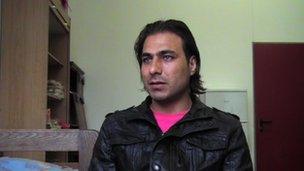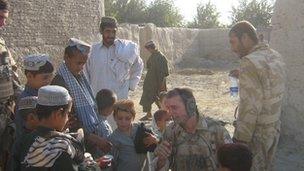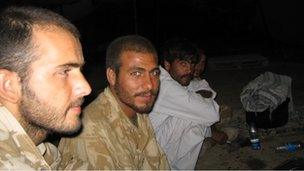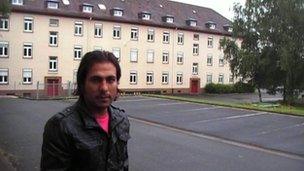Afghan interpreter left in limbo after fleeing Taliban
- Published
More than 2,000 interpreters have served alongside UK troops since the war began
In an old military base on the outskirts of the German city of Frankfurt, a young Afghan man known by British soldiers simply as Barri is stuck in immigration limbo, wondering if he will ever see his fiancee again.
Baryalai Shams worked as a British army translator in Helmand between 2008 and 2009, but left after his family received death threats.
The way his life has changed since then is a terrible story of how the Taliban deals with people they consider collaborators, and illustrates the challenges facing many former Army interpreters in Afghanistan.
Barri is 26 and has spent the last two years at the immigration camp in Aschaffenburg after he entered Germany on a false passport.
We only know Barri's story because he emailed his former commander to enlist his help. Major James Driscoll has now left the Army, but he felt a responsibility for the man who had risked everything to help his men.
I once met Barri and James at a remote outpost in Helmand province in September 2008 when roadside bombs planted by the Taliban were becoming the biggest killer of British troops.
The risks were high for the Afghan interpreters, but the rewards were good.

Barri Shams in his room at a German immigration camp
"I became rich - I was getting $1,800 every month and that was a lot of money for me. I bought a car and built a property and was able to start a business," Barri said into James's camera as the former major visited him in Germany this week.
"But my family got warnings from the Taliban. They were saying 'your son is not supposed to work with the infidel or coalition forces, or British'.
"My mother was very worried about me and told me to stop working as she didn't want to lose me."
He listened to his mother and left the British army after eight months, moving to Kabul and a job with a logistics company.
But it didn't make any difference - people in his home province of Laghman thought he was still being paid by the foreigners.
'They will kill you'
His father defended his son at the mosque saying the coalition forces were in Afghanistan to improve the country.
Two days later he was executed by the Taliban.
After another 20 days, Barri's elder brother, in whose shop in Jalalabad Barri had been hiding, was also killed.
"My mother told me 'if you are my son you have to get out from here…they will kill you'," Barri said.

Barri Shams (right) worked alongside British forces in Afghanistan
"So I sold my car and had $25,000 which I gave to an agent to take my younger brother, sister and mother to Europe illegally, as it was hard to get there legally," Barri said.
But not all of them made it.
A boat they had been smuggled onto capsized between Greece and Italy and both his mother and sister drowned.
Barri flew to Munich from Greece but was arrested when he arrived with the fake passport.
Refused asylum
Since then he has been at the immigration camp with his younger brother - unable to work, or travel further than a few miles away from the compound.
He has been refused asylum in Germany, refused travel to Britain and says it is too dangerous for him to return home.
He said: "I am young and I can work, but without work I have no life. I want to be like others and have freedom, but I am not free. I have no freedom and I have no life."
James left the Army last year and, after hearing Barri's story, he promised to try to help him.

Barri Shams at an Eid meal during his time working with British troops
He filmed Barri at the immigration centre - in the room he shared with three other men - and explained his own hopes that his former interpreter can come to Britain.
He told the BBC: "A lot of the interpreters become more than just work colleagues, they become friends to most of the British troops they work with and invariably a close bond is built between them."
"To see Barri in that situation is akin to seeing one of your own soldiers, your friends, in that situation.
"Anyone who knew him would desperately want to help him."
Defence Secretary Philip Hammond issued a statement this week outlining the new government policy towards former Army translators.
It said there was scope for those who worked in "particularly dangerous and challenging roles" to be eligible for resettlement in the UK, but it appeared to apply only to those who were still working for the Army last December.
'International law is clear'
Campaigners demanding more support for Afghan staff called the policy "half-baked," claiming it leaves many at risk.
Alex Wilks, campaign director for human rights group Avaaz, said: "We are talking about people who have been working as front-line interpreters, risking their lives.
"The government should have offered asylum to all of those who have been the eyes and ears of British forces and are now left at the mercy of the Taliban."

The immigration camp is an old US military base
A Ministry of Defence statement, issued in response to Barri's story, said: "Our pre-existing intimidation policy…applies to ALL local employees who served with British forces at any time during the operation, for any duration. This offers a separate range of protection and handling measures depending on the seriousness of the threat, including in extreme cases the option of relocation to the UK.
"Outside of these specific policies, international law is clear that asylum seekers should seek asylum in the first safe country they enter."
Barri was clear about his hopes - that he would be able to leave Germany and try to see his fiancee again after two-and-a-half years apart.
"My only hope I have is from the British - that the British government will take me out from this situation," he said.
"I speak the language, I was with UK people in Afghanistan and know their habits and culture.
"I would like to work. I am tired here. Please help me and take me and my brother from this situation."